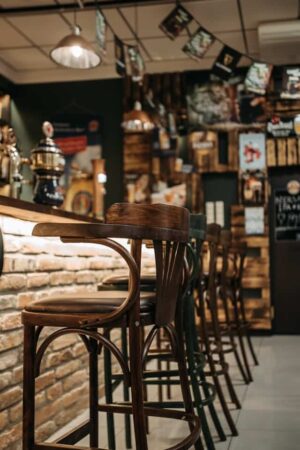While in graduate school in Iowa City in the mid-nineties, I got a job tending bar in a small town twenty miles to the south. The town, Kalona, had a large Mennonite population who didn’t drink, but everyone else–construction workers, young mothers, farmers, surly grandmothers, ladies in bedazzled jeans, truck drivers, and men of all ages–came to drink, smoke, play pool, fall in love, and sometimes fight at the Hard Luck Cafe.
My MFA program was high stakes, and soon I started drinking screwdrivers with breakfast to blunt the anxiety that walloped me the moment I woke up. I needed more stories, which was part of the reason I took this job–where better to find stories than in a small town Iowa bar, surrounded by people I would otherwise never meet?
One of the regulars, Duane, was so mean he was almost a caricature. When I’d arrive at 4pm, he was already sitting at the bar, drinking, and when I’d leave at ten, he’d still be there. He was probably only fifty, though I was twenty-five, so I remember him as an old man. Everything out of his mouth was barbed and nasty, but spoken with a sneer pretending to be a smile. That glimpse of teeth was only a vehicle for saying anything he wanted. On a night when it was raining hard, he said to me, “I’ll give you nine dollars to go out in the rain in that white t-shirt. You’ve got small tits but I bet you’ve got big brown nipples.”
No one escaped notice, and he was the one who told me about Half Eagle, the man who sat at the far end of the bar, his face a patchwork of plastic surgery, each piece of skin sewn by a doctor who must have admired quilts. “His girlfriend ran over him with the car, then backed up and ran over him again,” Duane said. “But he was an idiot even before that.”
Sometimes Duane’s equally awful father would sit with him at the bar, and sometimes his equally awful son would show up, too. Sometimes all three sat in a toxic line. Once he told them, “Don’t go home with fat women, boy. Only puppies should be fat.”
The rules for a lot of things were different in Iowa in the mid-nineties, and in that small town, no one cared if the bartender was smoking cigarettes and having a shot or two while working, but even so, I still had to serve, still was stuck behind the bar, a target for attention of all kinds. I could never get far enough away from Duane. I had the freedom of vice and self-expression, but not to escape.
I remember learning in Psych 101 that if you have a good initial interaction with someone, the more often you see them, the more you like them. The reverse is true, too: a negative first impression means that you’ll dislike them more every time you see them. This had shown itself to be true in my college coffee shop jobs–even the way some customers opened the door made you want to kill them. And you are stuck there, behind the counter, unable to escape your steadily increasing hatred, having to pretend it didn’t exist.
Duane may have been the only person in the world (besides me) who noticed my hair was thinning in the front. It might have been stress, or the hard water (the minerals made our white shower red-orange, like a murder scene; what was it doing to my body?), but when I leaned close to the mirror, I could plainly see my scalp. And under the bar lights, and Duane’s frequent nearness, he saw it, too. One night he said, “Your hair’s disappearing!” When I denied it, he crowed, “Oh yeah? Check your bald spot!”
“Check your bald spot!” became the first thing he’d say to me when I started my shift, and I dreaded being near him, the same way I’d later hide from my parents’ often-present five-year-old neighbor when I was visiting. Safely upstairs, I’d hear him ask my mom questions like, “Are you a witch? You have a lot of wrinkles like a witch.” I didn’t want to know how he saw me, and what he might say that would lurk in my brain for decades. There are always people who can expertly find your point of pain and push on it. And I was too young, too anxious, to understand that he was an angry, lonely, miserable man who lashed out because he had no other way of connecting.
But one night, Duane arrived after I did, and handed me a beautiful eggplant, a gift from his garden. This was decades before emojis, when an eggplant was just an eggplant, and the incongruity of this hateful man lovingly tending a garden and sharing some of its bounty with me kept me awake at night, thinking.
And a decade after knowing him, while teaching fiction workshops, I’d use him as an example of how a complicated villain is much more interesting than someone who is purely evil, as everyone, even the most hateful person, loves something, fears something, wants something.
Nearly thirty years later, washing my fifty-one year-old face before bed, I suddenly thought of Duane. He was probably dead, I realized. I was as old as he’d been when I knew him. Not 30 seconds later, I got a Facebook message from a guy I’d known from The Hard Luck, someone I hadn’t spoken to for many years.
He wrote, “Hello, Erin. Turns out your old friend from The Hard Luck passed away. Do you remember that obnoxious, wicked, rude man that got you so fired up you flicked your lit cigarette at him? LOL. I do. Time flies far too fast. I’ll always remember you being kind to me and introducing me to Lucinda Williams.”
I had little memory of this guy or being kind to him, but I did (and do) love Lucinda Williams, and I used to like to throw things at people (like full glasses of water), so it doesn’t seem impossible that I would have thrown a lit cigarette at Duane if pushed too far, or too many shots deep.
So Duane had come to say goodbye to me. But why? Maybe to remind me who I was then, so I could gather that long-ago girl in my arms and love her fiercely. Tell her she would be okay.
And now, from this great distance of time and experience, it is easy to see how unhappy Duane must have been, and feel something close to tenderness, as I imagine he only got meaner and sadder in the nearly thirty years after I knew him, but also, because I have become the wise mother to the frightened and traumatized girl I was. I imagine Duane in his vegetable garden, caring for the plants in a way he couldn’t for himself or others. I pictured his hands in the soil, his eyes bright, heart wide.
***
***
The ManifestStation publishes content on various social media platforms that many have sworn off. We do so for one reason: our understanding of the power of words. Our content is about what it means to be human, to be flawed, to be empathetic. In refusing to silence our writers on any platform, we also refuse to give in to those who would create an echo chamber of division, derision, and hate. Continue to follow us where you feel most comfortable, and we will continue to put the writing we believe in into the world.
***
Our friends at Corporeal Writing are reinventing the writing workshop one body at a time.
Check out their current online labs, and tell them we sent you!
***
We are looking for readers with an hour or so a week to read non-fiction submissions.
Interested? Let us know!
***
Inaction is not an option,
Silence is not a response
Check out our Resources and Readings if you agree.



Thank you for this wonderful story. It’s beautifully written, moving, and wise.